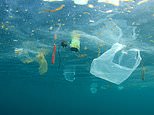
A new study has shed fresh light on the shocking extent of the global plastic crisis.
Researchers have discovered that as much as 4.9 million tonnes of plastic rubbish are floating in our oceans – an ‘unprecedented increase’ since 2005.
And without immediate action, they predict that the rate at which plastics enter our waters will increase a whopping 2.6 times by 2040.
‘This is a stark warning that we must act now at a global scale,’ said Marcus Eriksen, co-founder and researcher from The 5 Gyres Institute.
‘We need a strong, legally binding UN Global Treaty on plastic pollution that stops the problem at the source.’
A new study has shed fresh light on the shocking extent of the global plastic crisis
Researchers have discovered that as much as 4.9 million tonnes of plastic rubbish are floating in our oceans – an ‘unprecedented increase’ since 2005
In the study, the researchers analysed a global dataset of ocean plastic pollution spanning from 1979 to 2019.
Data was pulled from 11,777 stations across six key marine regions in the North Atlantic, South Atlantic, North Pacific, South Pacific, Indian and Mediterranean.
An analysis of the data revealed a significant and rapid increase in both the abundance and distribution of plastics since 2005.
Their estimates suggest that 82-358 trillion plastic particles (171 trillion plastic particles on average), weighing between 1.1-4.9 million tons (2.3 million tons on average) were floating in our oceans in 2019.
‘We’ve found an alarming trend of exponential growth of microplastics in the global ocean since the millennium, reaching over 170 trillion plastic particles,’ Mr Eriksen said.
While the reason for the surge from 2005 remains unclear, the researchers have several theories.
‘These observations may have been influenced by policy interventions, plastic production, fragmentation of existing floating plastic, and/or waste management and trade,’ they wrote in their study, published in PLOS ONE.
Worryingly, they warn that things could get even worse if drastic action isn’t taken immediately.
‘The accelerating abundance of plastic in the OSL [ocean surface layer] demands urgent international policy intervention to minimise ecological, social and economic harm,’ the team concluded.
In the study, the researchers analysed a global dataset of ocean plastic pollution spanning from 1979 to 2019
‘We’ve found an alarming trend of exponential growth of microplastics in the global ocean since the millennium, reaching over 170 trillion plastic particles,’ Mr Eriksen said
‘Without substantial widespread policy changes, the rate at which plastics enter aquatic environments will increase approximately 2.6-fold from 2016 to 2040.’
Last year, almost 200 nations, including the US and China, agreed to a new United Nations deal that will require them to cut down on plastic production by 2024.
The landmark agreement is designed to avoid the ‘planet’s ecosystem collapse’ from the spread of plastic, and microplastic particles, into every corner of the Earth.
It is the biggest green deal since the 2015 Paris climate accord, which committed governments to restrict greenhouse gas emissions and limit global warming.
Member states were locked in talks for more than a week in Nairobi, and have agreed to an outline pact to rein in plastic pollution – but the finer details will still need to be negotiated, including the level of plastic production cuts required.
Government officials cheered and punched the air after the adoption of a resolution of the legally binding treaty, which is due to be finalised by 2024.
‘Plastic pollution has grown into an epidemic. With today’s resolution we are on track for a cure,’ said Espen Barth Eide, President of the UN Environment Assembly (UNEA).
Source link
CHECK OUT: Top Travel Destinations
READ MORE: Travel News



